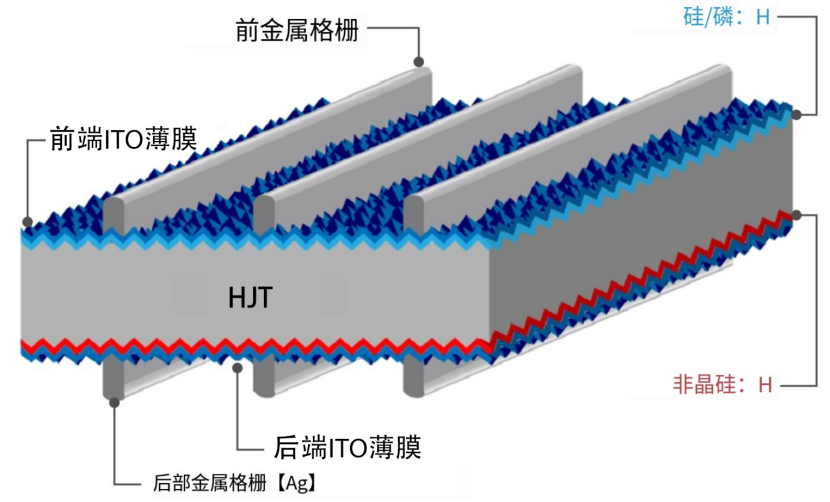
量子效率测试仪
PL/EL一体机
Sinton硅片少子寿命测试仪
Sinton硅块少子寿命测试仪
绒面反射率测试仪
3D共聚焦显微镜
在线四探针方阻测试仪
全自动扫描四探针方阻测试仪
在线薄膜厚度测试仪
晶化率测试仪
Horiba显微共焦拉曼光谱仪
傅里叶红外光谱仪
霍尔效应测试仪
分光光度计
全光谱椭偏仪
Horiba椭圆偏振光谱仪
TLM接触电阻率测试仪
超景深显微镜
网版智能影像测量仪
全自动影像测量仪
卧式拉力机
电池片稳态光衰老化试验箱
电池片紫外老化试验箱
电池片拉脱力综合测试仪
外观检验台
湿漏电测试系统
组件实验室EL测试仪
紫外老化试验箱
稳态光衰老化试验箱
电流连续性监测系统
PID测试系统
旁路二极管测试系统
LeTID测试系统
反向电流过载系统
脉冲电压测试系统
绝缘耐压测试仪
接地连续性测试仪
绝缘耐压接地测试仪
湿热环境试验箱
湿冻环境试验箱
热循环试验箱
动态机械载荷测试机
静态机械载荷测试机
冰雹冲击试验机
引出端强度试验机
霰弹冲击试验机
抗划伤(切割)测试机
剥离试验机
万能材料试验机(单臂)
万能材料试验机(双臂)
光伏玻璃透过率测试仪
醋酸测试试验箱
交联度测试系统
二极管接线盒综合测试仪
落球冲击试验机
半自动四探针
全自动探针式台阶仪
多通道太阳能MPPT系统
Horiba稳瞬态荧光光谱仪
大面积钙钛矿方阻椭偏二合一测试仪
大面积钙钛矿影像显微二合一监测站
钙钛矿P1激光划线测试仪
钙钛矿在线PL测试仪
钙钛矿在线方阻测试仪
钙钛矿在线膜厚测试仪
钙钛矿工艺检测工作站
手持式IV测试仪
便携式EL测试仪
手持热成像测试仪
户外组件多通道测试系统
光伏逆变器电能质量测试仪
无人机EL检测仪
IV测试仪
IVEL分选机
美能光伏科普 | 薄膜厚度对异质结电池光电转换率的影响
日期:2023-12-11浏览量:320
异质结电池的性能与其结构和工艺有着密切关系。其中,薄膜厚度是一个重要的参数,它直接影响了异质结电池的光电转换率。因此, 研究薄膜厚度对异质结电池光电转换率的影响,对于优化设计和提高效率具有重要的意义。「美能光伏」为帮助电池厂商精确检测出薄膜厚度,生产了美能Poly在线膜厚测试仪,该设备凭借行业领先的光学测量创新技术,利用光学干涉原理,科学、直观性的分析出薄膜厚度、光学常数等性能参数。今天,小美将为您普及薄膜厚度对异质结电池光电转换率的影响!

![]()
异质结太阳能电池的工作原理
异质结太阳能电池的工作原理是当太阳光照射在电池表面时,部分光被ITO薄膜反射,部分光被非晶硅薄膜吸收,部分光穿透非晶硅薄膜,到达晶体硅衬底。在晶体硅衬底中,光子激发出电子-空穴对,电子和空穴分别向N型和P型区域扩散,形成内建电场。在非晶硅薄膜和晶体硅的异质结处,由于能带错配,形成了能级阶跃,阻碍了载流子的复合,提高了电子和空穴的分离效率。在非晶硅薄膜中,由于掺杂的原因,形成了P-N结,进一步加强了内建电场。最后,电子和空穴通过ITO薄膜和金属电极被收集,形成电流和电压,实现光电转换。

异质结电池的结构原理图
![]()
薄膜厚度对异质结电池光学性能的影响
异质结电池的光学性能主要包括透光率、反射率和吸收率等,它们共同决定了异质结电池的光捕获能力和光生载流子的产生量。薄膜厚度对电池的光学性能有重要的影响。
● 薄膜厚度对透光率的影响: 薄膜的透光率随着薄膜厚度的增加而降低,这是因为薄膜厚度增加会增加光在薄膜内的多次反射的机会,从而增加反射光的强度。对于异质结电池而言,反射率越低,越有利于光进入晶体硅层,产生更多的光生载流子,提高电池的短路电流。
● 薄膜厚度对反射率的影响:与透光率的影响类似,薄膜厚度的增加会增加光在薄膜内的多次反射机会,从而增加反射光的强度。异质结电池也是如此,反射率越低,越有利于光进入晶体硅层,产生更多的光生载流子,提高电池的短路电流。
● 薄膜厚度对吸光率的影响:对于异质结电池来说,吸光率的大小取决于薄膜的材料和能带结构。对于非晶硅薄膜来说,由于其能带宽度较大,对可见光的吸收率较低,因此薄膜厚度对其吸收率的影响不大。对于晶体硅层来说,由于其能带宽度较小,对可见光的吸收率较高,因此薄膜厚度对其吸收率的影响较大。而对于异质结电池来说,吸收率越高,越有利于光在晶体硅层产生更多的光生载流子,提高电池的短路电流。

在讨论薄膜厚度的问题上,因薄膜厚度的物理参数会影响到异质结太阳能电池的性能,为此生产者往往需要通过合理、科学的生产过程为电池的性能创造更高效益。「美能光伏」作为检验者,为生产者提供了经验老练、令人十分满意的优质服务,并在为解决薄膜厚度的问题上,生产了美能Poly在线膜厚测试仪,为光伏企业用户及其电池厂商竭尽所能、应尽竭力!
![]()
美能Poly在线膜厚测试仪

商务联系:张经理 400-008-6690
美能Poly5000在线膜厚测试仪是专为光伏工艺监控设计的在线Poly膜厚测试仪,可以对样品进行快速、自动的5点同步扫描,获得样品不同位置的膜厚分布信息,可根据客户样品大小定制测量尺寸。
● 有效光谱范围320nm~2400nm
● 快速、自动的5点同步扫描
● 重复性精度<0.5nm
● 超广测量范围20nm-2000nm
● 在线监控检测实现零碎片率
● 实现全程产线自动化检测、大大节约检测时间
薄膜厚度对异质结电池的光电转换率有着显著的影响,过厚或过薄的薄膜都会降低电池的光电转换率。通过优化薄膜厚度,可以提高电池的光电转换率,达到最佳的匹配状态。「美能光伏」生产的美能Poly在线膜厚测试仪可以帮助电池厂商清晰表征出薄膜厚度,电池厂商可根据所得的精确薄膜厚度参数对异质结电池进行有效的调整和优化,从而生产出高效的异质结电池!









































































